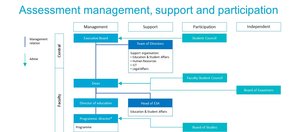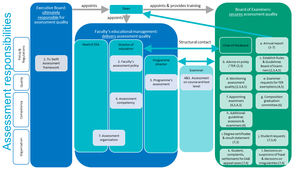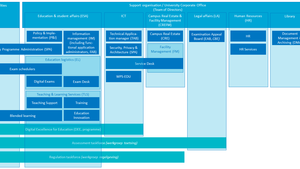5. Assessment organisation
The goal of this chapter is to show how the assessment organisation facilitates good quality assessment. A prerequisite for the implementation of assessment policies and therefore for good quality assessment is that the tasks and responsibilities of the assessment stakeholders are clear, which is discussed in section 5.1. More details, including the accountable person per task and who needs to be consulted is listed in the RACIzz matrices of Appendix D. Section 5.16 discusses the support of stakeholders during the execution of their tasks.
5.1 Tasks and responsibilities of main assessment stakeholders
This section and sections 5.2-5.14 describe the responsibilities and tasks of the main stakeholders of the assessment process (see Figure 9), in order to contribute to the following condition:
| condition 16: | TU Delft, the faculties and the boards of examiners ensure that the tasks and responsibilities of the different stakeholders with respect to assessment are clear. |
Assessment management, support, and participation at central and faculty level. Officially, the faculty student councils and boards of examiners advice the dean. However, directors of education can take deans’ role for assessment since they are responsible for education. See Appendix E for differences between faculties.
The main tasks related to assessment are summarized in Figure 10 and are described in more detail in sections 5.2-5.9 and 5.13.
This diagram indicates which main stakeholders (dark and light blue & green boxes) are responsible for which assessment building block (grey blocks, numbered 1-7, see Figure 1 / Figure 4), and board of examiners tasks (light green blocks, see running text in next section for description). Adapted from van Zijl & Jaspers (2012, 2014)35,36. See running text in 5.8 for more information on the division of responsibilities between the board of examiners and the faculty.
* Programme director: Synonym: ‘director of studies’. **Sub-boards of examiners appoint examiners in the faculties AE, AS, CEG and EEMCS.
5.2 Executive Board (tasks and responsibilities)
The Executive Board37 (EB)
- provides the assessment framework that the faculty’s assessment policy must comply with, and monitors the compliance
- establishes the model TER and model R&G
- ensures the professional development of the members of the boards of examiners (by providing a yearly training, and via knowledge exchange in the meetings of the chairs of the BoExs and secretaries to the BoEx, respectively)
- ensures a training offer to support examiners (including the offer by TLS)
- ensures good logistic support of the exam process (see D.1, D.3, and D.4)
- ensures a possibility of appeal for students by establishing an Examination Appeals Board (EAB, Dutch: Commissie van Beroep van de Examens, CBE)25
5.3 Student Council (tasks and responsibilities)
The Student Council
- advises on the TU Delft assessment framework because it is an educational policy document
- advises on educational and therefore also on assessment topics, with and without request from the Executive Board
5.4 Deans (tasks and responsibilities)
The dean38
- establishes the TER on a yearly basis, considering the provisions in the model TER and other guidelines of the EB (model FR 3.2.a)
- monitors the execution of the TER and reports on this to the EB (model FR 3.2.d)
- establishes the board of examiners per programme or group of programmes (model FR 3.2.e), and if applicable sub-boards of examiners
- appoints members of the (sub-)board(s) of examiners after consulting the current members of the BoEx (WHW art. 7.12a sub 4, model FR 3.2.e)
- ensures that the board of examiners can work in an independent and expert manner by appointing well-qualified members, ensuring that time spent for the board of examiners is recognised in R&D talks and by providing sufficient secretarial support. Discusses improvements based on the annual report of the board of examiners
- ensures that the departments carry out the HR and training policy of the faculty regarding examiners
5.5 Heads of Education and Student Affairs in the faculty (tasks and responsibilities)
The head of Education and Student Affairs (ESA) in the faculty
- ensures good organisation and supportaaa of exams and other assessments, together with the director of education (EMR 24a sub 5 and model FR 4.4-4.5.a). If applicable, this includes faculty specific assessment tools or assessment supporting tools.
- ensures professional support and advise for the board of examiners, the programme director(s), and the responsible examiners
5.6 Directors of education (tasks and responsibilities)
The director of education
- establishes the assessment policy of the faculty (Executive and Management Regulations, EMRbbb art. 24a sub 2a) after considering the advice of the board(s) of examiners, the board(s) of studies, and faculty student council (FSC)
- is accountable for the implementation of the assessment policy and the monitoring thereof
- monitors and develops the didactical qualities of teaching staff in the faculty (EMR 24a sub 2d and model FR 4.5.d)
- ensures good organisation and supportccc of exams and other assessments, including the supporting software tools, together with the faculty’s head of ESA (EMR 24a sub 5 and model FR 4.4-4.5.a)
- ensures that there is a quality assurance system to evaluate the quality of the programmes and their constituent courses, including their assessment (model FR 4.5.a)
5.7 Programme directors (tasks and responsibilities)
- is responsible for executing the assessment policy in their programme
- is responsible for formulating the final attainment levels (FALs, synonyms: intended learning outcome / ILO, exit qualification) of their programme
- is responsible for ensuring that their programme meets the standards of the assessment framework of the accreditation
- is responsible for the content of their programme (courses, EC, learning objectives) and ensures that the combination of courses that form the programme meets its FALs
- ensuring that their programme has an up-to-date assessment programme that is in line with the faculty’s assessment policy
- consults with the BoEx, the board of studies and the faculty student council on the assessment agreements and the programme assessment plan
- consults with department chairs on the contribution of departments to the programme and makes decisions on their contribution56F (model FR art. 6.5.c)
- Programme directors are called ‘directors of studies’ at CEG and TPM. At IDE, AE and ME, the entire educational management team (AE and ME) or the entire board of education (IDE) has the responsibility of the programme director as described above.
5.8 Division of assessment responsibilities between faculties and boards of examiners
The division of assessment tasks between the director of education (and their educational management team) and the BoEx is often summarized by stating that the director of education is responsible for delivering good quality assessment and that the board of examiners secures that the quality of assessment is up to standards. Figure 10 shows this division of responsibilities between delivering and securing (Dutch: zorgen en borgen).
A division of tasks and responsibilities between stakeholders for written exam process that are administered on campus, remote and hybrid is listed in D.4 (Central & faculty organisation of scheduled exams).
5.9 Boards of examiners (BoEx, tasks and responsibilities)
| condition 17: | The boards of examiners secure that graduates meet the final attainment levels of the programme by executing their legal tasks, listed in 5.9. |
The board of examiners (BoEx) is an independent committee that has a broad set of tasks and responsibilities, which are detailed in the green block on the right of Figure 10. The tasks and responsibilities that specifically focus on the assessment of a course or the programme as a whole are listed below.
The board of examiners secures that graduates meet the final attainment levels of the programme (WHW 7.12 sub 2), and executes the following tasks:
|  |
|  |
|  |
|  |
 | |
|  |
|  |
|  |
|  |
|  |
|  |
|  |
|  |
 |
A detailed description of BoEx’s tasks h-j can be found in the RACI matrix in D.5 (Tasks related to the boards of examiners).
5.10 Division of assessment responsibilities between board of studies and faculty student council
The faculty student councils have the right of approval on the WHW parts that cover assessment practicalities (i.e. WHW 7.13 h-z except v), while boards of studies have the right of approval on the WHW parts that describe the content of the programme (WHW 7.13 a-g except f, including v). The next two sections include details.
5.11 Faculty student councils (tasks and responsibilities)
A faculty student council
- has the right of approval on the following parts of the TER (see WHW 9.38.b); most of them are assessment related:
- number, order, and scheduling of assessments
- order, timeslots, and number of times that assessments and degree audits are offered on a yearly base
- registration procedure and registration period for assessments and degree audits
- assessment category per assessment: written, oral or ‘other’
- how students with a functional limitation are facilitated in their assessments
- reduction of validity of course and assessment grades
- if oral exams are public (or not)
- maximum grading period
- procedure and time slot for student review of their assessed written assessments.
- procedure and time slot for students reviewing questions, assignments, and grading guides of written assessments
- grounds on which students can get exemption from assessments based on previously passed higher education courses or other acquired competences
- entry requirements for courses and assessments
- mandatory practical exercises
- monitoring of study progress and individual study guidance
- programme design
- has the right of advice on the rest of the TER (WHW 7.13, see Board of Studies below)
Some of the parts of the TER are the same for all programmes at the TU Delft. In these cases, the TU Delft Student Council has the right of approval and the right of advice. These parts are indicated in the model TER with red font.
5.12 Boards of studies (BoS, tasks and responsibilities)
The board of studies
- has the right to approve specific parts of the TER:
- the evaluation of education
- content of specialisations
- final attainment levels
- design of practical exercises
- ECs of the programme and per course and programme
- selection of students
- honours programmeiii
- has the right to give advice on the remaining parts of the TER (see 5.11 Faculty student councils (tasks and responsibilities))
- assesses the execution of the TER on a yearly basis
- can give solicited as well as unsolicited advice on topics that are relevant for the quality of education, including the faculty’s assessment policy and the programme assessment plan
Out of these responsibilities, point 1a, 1c, 1d, 2 and 4 are relevant for assessment on course or programme level.
5.13 Examiners (tasks and responsibilities)
- Examiners are responsible for the quality of course assessment and for meeting the requirements of the TU Delft and the faculty. This includes the responsibility for the content of the assessment, the assessment method(s), and the grading process and grading of student work.
- Examiners are responsible for a clear communication about assessments to students.
- Examiners are responsible for providing good feedback (timely, specific and balanced39) to students.
- Examiners are responsible for facilitating student review (see Right to review (TER art. 20)) and discussion of graded work (see Right to discussion (TER art. 21)).
An overview of the stakeholders in course assessment related tasks can be found in D.3 (Assessment responsibilities and processes in programme & course assessment design, administration, and evaluation).
5.14 Assessor
Assessors are postdocs, researchers, PhD students, student assistants, external people, or others who assess student work and/or student performance, and provide feedback, under the responsibility and supervision of an examiner. As opposed to examiners, they have an executive function as they do not have a role in developing assessments.
The course examiner is responsible for ensuring that all their assessors are competent for their task (Quality requirement 9) by providing them with clear grading guidelines and with training, for example in calibration sessions.
5.15 Student assistants (tasks and responsibilities)
In the faculties, student assistantsjjj (SAs) can do two types of assessment-related tasks for examiners, under the supervision of the examiner:
- Assessor tasks: SAs can suggest scores and feedback for student work. The examiner determines the grades and is responsible for the quality of the feedback, scores, and grades.
- SAs may help examiners to set-up (digital) exams (e.g. transferring questions to the assessment tool, adjusting the test settings in the assessment tool, lay-out and first check of questions and answer model, etc.).
SAs with the second type of assessment-related tasks are required to use their employee accountkkk,40. The account expires after the end of their contract. The examiners are responsible for revoking the digital privileges after the end of a task. Central SAs (‘support assistants’) at TLS Support advise examiners on and support them with digital assessment tooling. These central SAs do not have direct access to exams, but assist lecturers based on screen sharing or screen shots.
5.16 Division of responsibilities between course examiners, examiners, assessors, lecturers and responsible lecturers
- Responsible lecturers are responsible for the organisation and the content of the course in which they are ‘responsible lecturer’ according to the study guide.
- Teaching staff includes all staff in a course, including SAs.
- The teaching staff of each course includes one or multiple examiners. One of them, the course examiner, takes final responsibility for the creation and execution of all assessment (tasks) in the course. This includes the communication about all assessmentlll.
In many cases, the responsible lecturer is an appointed examiner and therefore also takes responsibility for the course assessment. However, if they did yet not complete their UTQ, a course examiner is added to the teaching team to take responsibility for the assessment.
5.17 Support of assessment stakeholders
Services are Legal Affairs, Education & Student Affairs, ICT and Human Resources. Dark blue boxes are organisational units, light turquoise boxes are committees.
To realize good quality assessment and assessment organisation (Quality requirement 8), the Executive Board (EB) has created an extensive support programme. The different boards of the TU Delft provide a range of support (see Figure 11) which the sections below describe.
| condition 18: | TU Delft and the faculties support the programmes, and the courses in the process and execution of assessments. |
-
The University Corporate Office / Education and student affairs (ESA) offers:
- Teaching & Learning Services (TLS):
- teacher support desk for support questions on assessment tooling and for educational assessment advice
- dedicated training aimed at assessment competence for examiners (UTQ ASSESS) and members of boards of examiners (BoEx training)
- additional workshops on specific assessment topics
- online knowledge base on assessment (teaching support site), including the TU Delft assessment manual16
- educational support for assessment projects in programmes and faculties.
- an Exam Desk that processes registration for scheduled exams and the required invigilators
- a digital exam desk (Digital Exams) that supports the preparation and administration of digital on-campus and remote scheduled exams
- policy support for TU wide assessment policy affairs (Policy & Implementation, P&I)
- the programme ‘Horizon’ which is the first line contact for students who require special adaptations to take part in assessment and education in general, due to functional disabilities, chronic disease, or other exceptional circumstances (Quality requirement 7).
- a programme (Digital Excellence for Education, DEE) to improve the educational logistics, educational administration, and teaching and learning tools
- administrative support (ESA-SPA) for grade registration, assessment of grade books, and production of degree certificates
- a scheduling office that schedules exams
- a multidisciplinary assessment taskforce (AT) that prevents and helps solving TU Delft assessment challenges by exploring and initiating solutions, and aiding communication between faculties, TU Delft central and lecturers on assessment developments
- Teaching & Learning Services (TLS):
-
The boards of ESA and ICT together facilitate
- a diverse assessment tooling landscape (see 1.4)
- technical and functional application managers (TAB and FAB) for assessment related tooling
-
The board of legal affairs facilitates
- the support of the Examination Appeals Board (EAB, Dutch: Commissie voor Beroep van de Examens, CBE).
An overview of the tasks and stakeholders in regulations is listed in the RACI in Appendix D.2 (Legal framework & TU Delft wide assessment agreements).
-
The board of human resources (HR) facilitates
- the administration in the HR system of UTQ certification (see Administration of assessment qualifications in 6.4).
zz RACI matrix: matrix that indicates per task who is Responsible (i.e. who needs to take action), who can be held Accountable, who needs to be Consulted, and who needs to be Informed.
aaa It depends on the faculty how this support is organised, see Appendix E.
bbb Dutch: Bestuurs- en beheersregelement TU Delft (BBR)
ccc It depends on the faculty how this support is organised, see Appendix E.
ddd ‘Director of studies’ is a synonym of ‘programme director’ that is used at AE, AS, EEMCS, CEG (see Appendix E).
eee At IDE, AE and ME, the role of programme director is shared within the ‘board of education’. It consists of all programme directors, the director of education and in case ofME and IDE also of the faculty’s head of ESA. See Appendix E.
fff At IDE, EEMCS and ME, this responsibility is divided differently. See Appendix E.
ggg E.g. in the faculty CEG
hhh E.g. in the faculty IDE
iii in WHW 9.18a, these parts are listed, referring to the TER description in WHW 7.13
jjj By student assistants, we mean students who work as teaching assistants.
kkk In addition, some tools like Möbius also require an employee account for grading and giving feedback.
lll At TPM, each course has two responsible examiners. This diminishes the vulnerability to e.g. illness and staff turnover. The study guide indicates who is the first and second responsible examiner.


